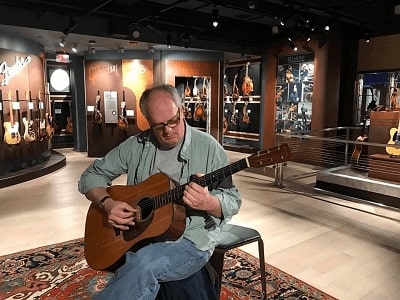President Faculty Award
The President's Award for Outstanding Research and Creative Activity recognizes the achievements of senior faculty members. To qualify for the award, one must be a current tenured faculty member. The award selection committee considers the nominee's research and creative activities throughout their careers, with a special emphasis on accomplishments while at CMU.
2021-2022 Award Recipients
Dr. Will Anderson, Broadcast & Cinematic Arts
Dr. Will Anderson, a Broadcast and Cinematic Arts professor, has received the Central Michigan University 2022  President’s Award for Outstanding Research and Creative Activity. This award can only be received once in a professor’s career and is one of the most prestigious awards CMU has to offer. “It represents recognition and adjudication of a lifetime of work,” said Dr. Anderson, who had studied audio dramas and electronic promotion for about 25 years.
President’s Award for Outstanding Research and Creative Activity. This award can only be received once in a professor’s career and is one of the most prestigious awards CMU has to offer. “It represents recognition and adjudication of a lifetime of work,” said Dr. Anderson, who had studied audio dramas and electronic promotion for about 25 years.
Over the past year, Dr. Anderson has worked on a book about two things he loves, writing and guitar, which he hopes to promote on a book tour in summer 2023. Dr. Anderson also hopes to continue working to find new uses and distribution avenues for audio dramas.
Dr. Thomas Gehring, Biology
 Dr. Thomas Gehring, a professor in the biology department, received the Central Michigan University 2022 President’s award. This award aims to recognize the success of senior faculty members and can only be received once in a professor’s career. “It’s the highest honor CMU bestows to researchers here on campus,” said Dr. Gehring.
Dr. Thomas Gehring, a professor in the biology department, received the Central Michigan University 2022 President’s award. This award aims to recognize the success of senior faculty members and can only be received once in a professor’s career. “It’s the highest honor CMU bestows to researchers here on campus,” said Dr. Gehring.
Dr. Gehring is a wildlife and conservation biologist whose research focuses on human-wildlife conflicts and finding ways to resolve these issues in a peaceful manner. One of his major areas of study is the interaction between gray wolves and livestock, with the goal of finding ways to protect livestock from the gray wolves in a nonlethal way. Some methods they tested consisted of shock collars, fladry, which is the hanging of flags on a rope around the perimeter of the pasture to create a visual barrier that wolves won’t cross, and livestock guard dogs. Working with the guard dogs was Dr. Gehring’s favorite approach. “The guard dogs led to areas of biology and sociology and economics that I had never thought about,” said Dr. Gehring, “Allowing farmers to be more content in life because they’re not stressed about wolves was so rewarding.”
Going forward, Dr. Gehring plans to continue his coastal wetland research, looking into long term patterns and changes in wildlife and water levels. He hopes that this research will help to inform policy and provide better insight on the environment around the Great Lakes. Dr. Gehring will also become more involved with gray wolf issues again and plans to begin experimentation with livestock guard dogs again on a much bigger and international scale.
Stories by ORGS intern Ellie Heron
February 2022